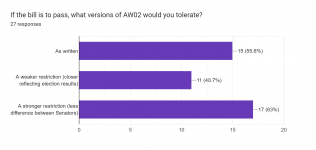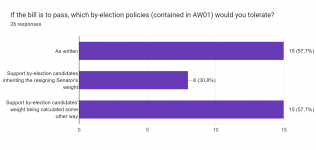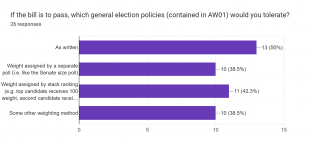EBC Poll: Citizens Cautiously Optimistic About Weighted Voting
Majority Favor Giving the Idea a Chance
Written by @Rand
Majority Favor Giving the Idea a Chance
Written by @Rand
After hours of painstaking analysis, EBC's amateur data scientists have concluded that citizens are ready to take the conversation on weighted voting a step further.The poll was run for 96 hours earlier this month, and it raked in 31 responses. Our survey experts took a unique approach, asking many detail-oriented questions first, and then having high-level questions at the end, after giving respondents a bit more time to stew on their thoughts and weigh the pros and cons. That being said, for the reader's enjoyment, we will be taking a "bottom line up front" approach to this analysis.
One more thing! For purposes of these upcoming "high level" questions, which were held on the last page of the survey, we grouped respondents into two categories: all citizens, and experienced citizens. Experienced citizens were determined by a proprietary, uniform alogrithm assigning score to their citizenship age (<1, 1-2, 3-5, and 5+ years), offices held, Presidential experience, and number of Senate campaigns. The top 15/31 scorers were grouped into the "experienced citizens" category.
Let's dive in.
Big Ideas
Where Do You Stand On The Concept Of Weighted Voting?Okay, now for the results.
On this question, a cool majority of 53.5% of all citizens clocked in supporting weighted voting as a concept, with an additional 7.1% unsure. Experienced citizens were less sure of themselves, with 15.4% unsure, and 46.2% in favor. Maybe experienced citizens are more wary of new ideas, or maybe they're just more pensive.
That being said, those who are opposed are strongly opposed. Not one experienced citizen was somewhat opposed, and in both samples, those strongly opposed outnumbered those strongly supportive.
Are You Open To Trying Weighted Voting?
As you're about to see, respondents were a bit more generous with this particular wording.
In both samples, the "Strongly opposed" group mostly held true, with the "No, not in any form" scores following closely. In the all citizens sample, 32.1% were strongly opposed and 26.7% do not want to try weighted voting in any form (-5.4%); while in the experienced citizens sample, those figures were 38.5% and 35.6%, respectively (-2.9%).
The biggest win here for proponents of weighted voting is that 50.0% of experienced citizens are open to trying weighted voting in any form (up 19.2% from those strongly supporting), and a large 73.4% majority of all citizens are open to trying the idea.
Where do you stand on sending this bill, if passed by the Senate, to referendum?
This question did not vary much between the two sample groups, so we'll just show the all citizens chart. The options are simplified on the chart, but on the survey they appeared as:
- Should go to referendum immediately
- Should go to referendum after a trial period (e.g. one to three terms)
- Does not need to go to referendum
A slim majority of 53.3% favor immediate referendum, while 40.0% prefer a delayed referendum. Only a couple of citizens felt a referendum is unnecessary.
Surprisingly, this 40.0% result exactly matches a later question...
Where do you stand on passage of some form of this bill, with an automatic sunset or automatic referendum provision?
...where citizens were asked whether they would support the bill regardless of a sunset provision, or ONLY if it contained an automatic sunset or automatic referendum position.
Unfortunately for this novel idea, it does not seem to hold majority support.
However, it's worth noting that here, only 7 of 31 respondents indicated unwavering opposition (down from 9 of 31 strongly opposed in the first question analyzed), meaning the length of this poll was surely waring down those curmudgeonly conservatives!
Merits of the Proposal
Next, we'll move backwards in the survey to the section asking respondents to weigh in on the various pros and cons of the weighted voting concept. This chart is our most in-depth yet! As you'll see on the Y-axis, a score of 3.0 or higher means that sample generally agrees with the statement shown on the X-axis, whereas a score of 3.0 or lower means that sample generally disagrees with the statement shown on the X-axis.
Let's break it down further. Here are the positive statements citizens, on average, agreed with.
"Weighted voting will..."
- Make voters more open-minded to even Senate sizes (3.79).
- Promote greater effort in elections by experienced candidates (3.63).
- Cause Senate by-elections to be more competitive (3.38).
- Cause voters to support larger Senate sizes (3.34).
- Cause voters to support a greater number of candidates (3.28).
- Cause Senate elections to be more competitive (3.21).
"Weighted voting will..."
- Discourage less experienced citizens from running (3.30).
- Discourage underrepresented demographics from running (3.10).
"Weighted voting will..."
- Cause Senate decisions to closer match public sentiment (2.97).
- Cause Senate compositions to be more representative (2.97).
- Cause less popular candidates to win more often (2.90).
Weighted Voting on Which Matters
Respondents were asked the following question: "I would (oppose/tolerate/favor) this Senate decision being decided by weighted voting."
From the results, we can see that a majority of citizens would tolerate or favor the following decisions being decided by weighted voting:
- Non-Constitutional laws (85%)
- Cabinet confirmations (63%)
- Justice confirmations (52%)
That being said, Constitutional amendments, Speaker elections, and Treaty approvals/repeals, while still having majority opposition, had the highest favorable ratings besides Non-Constitutional laws.
Legislation Breakdown
Last but not least, our professional question-askers broke the legislation down into smaller components, and asked respondents whether they would favor the law as written, or with an alternative structure. Here's how our citizen-respondents weighed in.
AW01. Each Senator is assigned a "weighted vote" equal to the number of votes cast for that candidate in the most recent General Election or By-Election in which they were a candidate.
AW01 part 1: If the bill is to pass, which general election policies (contained in AW01) would you tolerate?
AW01 part 2: If AW01 is to pass as written, which of the following election voting methods would you tolerate?
AW01 part 3: If the bill is to pass, which by-election policies (contained in AW01) would you tolerate?
AW02. Each Senator shall have, at minimum, 50% (rounded up) of the "weighted vote" of the Senator with the greatest "weighted vote."
After seeing this section of legislation, citizens were asked: "If the bill is to pass, what versions of AW02 would you tolerate?"
VT04. All Senate matters, unless otherwise specified, require a weighted simple majority to pass.
From this amendment, citizens were asked: "If the bill is to pass, what versions of VT04 would you tolerate?"
Conclusion
When challenged on the specific elements of the bill, respondents generally preferred weaker versions of the bill. That being said, the average citizen agreed with 6 out of 8 of the listed reasons to implement weighted voting. If weighted voting is pushed forward, voters can look forward to more even Senate sizes, more competitive Senate elections, and more engagement by traditionally 'safe' Senate candidates, most respondents agreed. At the same time, policymakers should be careful to consider whether the proposal would discourage new or underrepresented groups from pursuing Senate seats.
With all that said, in this editor's opinion, this poll clearly shows that Europeians are ready to give weighted voting a try. At the same time, there is a healthy amount of uncertainty surrounding the proposals, especially among more experienced citizens. Then again, what new idea hasn't garnered skepticism? We encourage the Senate to carefully consider these results, and to strongly consider a fair compromise that lets this new idea see the light of day, where it can gather some real-world data. Again, if the right balance can be struck, a large 72% majority of citizens are open to trying this idea!


